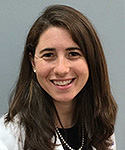September 29th, 2020
Below Hospital Deck
Stephanie Braunthal, DO
There is debate about which of the many medically themed TV shows best depicts our lives in medicine. Is it the conundrums of House? The interpersonal drama of Grey’s Anatomy? The camaraderie and antics of Scrubs? While each of these capture unique problem solving, empathy, relationships, and burdens that accompany being a physician, I had yet to find a show that accurately reflected the day-to-day reality of being a resident. That is, until I discovered the Below Deck series on Bravo. Now, I know this seems silly. Below Deck? A reality show about the crew of super yachts that charter wealthy guests on luxury nautical vacations? Although the show does not feature a single doctor, save the occasional guest or local physician summoned to evaluate a deckhand’s injury, I find that, rather than constantly noting how inaccurate scenes are to real life (like I do with medical dramas), I instead draw parallels between the scenarios on the boat to those in the hospital. The show highlights struggles within a hierarchical work environment, discussions about duty-hour restrictions, occupational safety concerns, fast-formed friendships, and the occasional romances that strike as crews on each season work together to repeatedly achieve high-stakes outcomes. Starting to sound familiar? It certainly did to me.
The cast of each Below Deck series consists of a captain, first mate, engineer, chef, and two teams of deckhands and stewards. The latter each have an experienced lead (“bosun” on deck, “chief stew” interiorly), a moderately experienced second rank, and an inexperienced third rank. Structural comparisons are obvious. Residency programs have directors, program leadership, support staff, and chief residents who direct and oversee operations and the growth of the trainees. The residents themselves work in the hospital as pairs or trios, with a senior overseeing at least one intern. In the same way that crew members shuffle from yacht to yacht, residents rotate from service to service. While some characters recur, each season generally follows a new crew that has never worked together. Our residents similarly assume a role with universal responsibilities based on their postgraduate year (PGY) level, which makes transitioning between diverse rotations relatively seamless. Medicine is not hospitality, but it is nevertheless a service profession. While residents are not required to prepare elaborate meals or frivolous theme parties, their creativity is constantly pushed to the limits, expanding their differential diagnoses and navigating seemingly insurmountable obstacles to get patients the care they need. Both professions rely on the success of the group to not only ensure the safety of human lives, but also for career-promotion opportunities, which in the case of Below Deck is thousands of dollars worth of tips.
 The more episodes of Below Deck I watch, the more predictable the drama becomes: guests don’t like the food, the captain is disappointed in the crew, someone doesn’t answer the walkie-talkie, the chief and her stews aren’t getting along, and so on. Dissatisfaction, unmet expectations, and miscommunications are also common sources of tension in the hospital, particularly on teaching services where everyone has different degrees of experience. As they progress in training, the most successful residents not only learn to resolve conflict, they also develop strategies to avoid it. These include taking the time at the beginning of the rotation to define roles and expectations with the intern and attending, team communication, proactively reevaluating team goals, and regularly delivering feedback. Incidentally, when the Below Deck crews employ these tactics, they navigate the gratuitous requests of their clients and the unexpected perils of open seas with relative ease.
The more episodes of Below Deck I watch, the more predictable the drama becomes: guests don’t like the food, the captain is disappointed in the crew, someone doesn’t answer the walkie-talkie, the chief and her stews aren’t getting along, and so on. Dissatisfaction, unmet expectations, and miscommunications are also common sources of tension in the hospital, particularly on teaching services where everyone has different degrees of experience. As they progress in training, the most successful residents not only learn to resolve conflict, they also develop strategies to avoid it. These include taking the time at the beginning of the rotation to define roles and expectations with the intern and attending, team communication, proactively reevaluating team goals, and regularly delivering feedback. Incidentally, when the Below Deck crews employ these tactics, they navigate the gratuitous requests of their clients and the unexpected perils of open seas with relative ease.
While it might seem like I have been a fan since its inception, I only started watching Below Deck a couple of months ago as a frivolous escape from boards studying, chief responsibilities, and the serious realities of our world during the past year. I did not anticipate that the show would provoke so much introspection, nor did I realize how valuable it has been as a means of communicating my experiences during residency and chief year to my friends and family outside of medicine. Next time someone asks what it’s like to be a resident, I’ll simply say, “It’s like working below hospital deck.”




Such a well written article! Very interesting perspective about the parallels between medical residency and the customer service industry.
Stephanie, I love your boating themed analogy! As attendings, we become “captain of the ship” in some ways (certainly in surgery/the OR), so perhaps we finally graduate to “above hospital deck”?